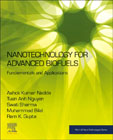
Nanotechnology for Advanced Biofuels: Fundamentals and Applications
Nadda, Ashok Kumar
Nguyen, Tuan Anh
Sharma, Swati
Bilal, Muhammad
Gupta, Ram K.
Nanotechnology for Advanced Biofuels: Fundamentals and Applications highlights emerging techniques for the formulation of fuels, using nanotechnology and bio-based concepts. The addition of high-energy nanoparticles and biologically derived molecules in the liquid fuel can increase the potential of energy-rich compounds. The key challenges, in the production of nanotechnology-based fuels, and their combustion or ignition during the operation, need to be considered. The book also emphasizes the emission of oxidized particles and by-products of incomplete combustion. The concept of nano-fuels is an emerging field that can be further assisted by biofuels, or the addition of bio-based energy-rich molecules, to provide a high combustion rate. Generally, such fuels are formulated by adding the nanoparticles of aluminum (A1), iron (F1), and boron (B1) in the raw diesel. Each type of nanomaterial and biomolecule, employed to modify the existing raw fuels, is highlighted. Such alternative fuels, with improved properties, show high-energy density, more combustion power, and quick release of a greater amount of energy, compared to their original form. Also, these fuels can sustain the flame for a longer time, show reduced ignition delay, agglomerate ignition, and improved combustion rates. The improvement in the combustion rate increases the thermal efficiencies of brakes at maximum loading conditions. The bio-based energy-rich fuels are largely diffused in conventionally used fuels. The addition of biofuels and nano-additives to pre-existing fuels can offer opportunities, for developing the modified fuels in domestic industries, with the maximum usage of renewable biomass. This is an important reference source for materials scientists, energy scientists and chemical engineers who want to understand more about how nanotechnology can help create more efficient biofuels. Shows how nano-additives can significantly improve the properties and therefore efficiency of biofuels Provides information to help readers to better understand the basic and advanced applications of nano-additive-based biofuels Assesses the challenges of manufacturing nanotechnology-enhanced biofuels on an industrial scale INDICE: 1. Biouels: An overview 2. Green approaches to blend fuels with nanomaterials 3. Nanomaterials as additives for use in conventional fuels 4. Nanomaterial-bound biocatalysts for fuel synthesis 5. Advanced techniques for the formulation of nano-additive blended fuels 6. Effect of nano-additives on the performance of ignition engines 7. Characteristics and effects on ignition of fuel with nano-sized materials 8. Biomass-derived additives as blends in fuels 9. Nano-formulated biofuels and their performance 10. Non-edible waste bio-based oils as additives in conventional fuels. Magnetic nano-fuels and their performance 11. CNT-based nano-fuels: performance and emission 12. 2D nanomaterials as lubricant additives 13. Graphene quantum dot/nanoplatelets as nano-lubricant additives 14. Metal oxide-based nanomaterials as additives in nano-fuels 15. Rare earth metals and their derivatives as additives in nano-fuels 16. Boron nanoparticles as nano-fuel additives 17. Cerium and aluminum-based nanomaterials as additives in nano-fuels 18. Radiation-mediated combustion of nano-fuels and its effects 19. Applications of nano-fuels in automobiles and industries 20. Effects of nano-fuel additives to reduce total emissions 21. Toxicity and hazardous effects of nano-additives in fuels 22. Adverse effects, on respiratory and nervous systems, of nanosized additives in fuel 23. Technical challenges and practical viability (Nano-fuels stability and durability) 24. Economy aspects and future visions
- ISBN: 978-0-323-91759-9
- Editorial: Elsevier Science
- Encuadernacion: Rústica
- Fecha Publicación: 01/04/2023
- Nº Volúmenes: 1
- Idioma: Inglés
